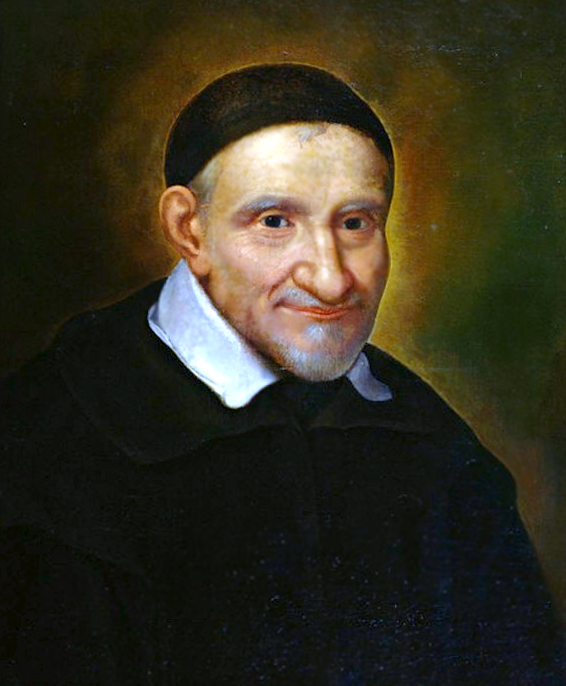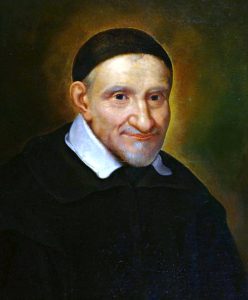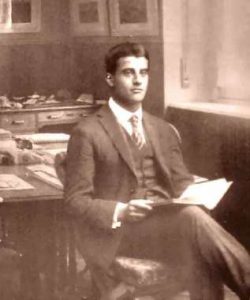
St. Vincent de Paul
By Renae Kranz

St. Vincent de Paul is a saint most of us are familiar with because of the society created to help the poor that bears his name: The Society of St. Vincent de Paul. He had a passion for helping the poor and sick in France.
But he wasn’t always the great man we’ve heard about. Before his conversion to a deep faith and love of the poor, he was known to have a short temper. And there was something else about this saint that made him very much like us and it might surprise you.
We’ll get to that soon enough. Ah, suspense.
St. Vincent de Paul was born in Pouy, France, in 1581 to peasant farmers. Although his main job growing up was herding the family’s livestock, he was a bright child who excelled at reading and writing. By the time he was 15, his father sent him to seminary, paying for the tuition by selling the family’s oxen.
Strangely, the university he attended was a bit on the wild side. Fights broke out among students, sometimes turning into armed battles. Studying and spiritual growth were surely difficult in these circumstances. Vincent persisted, however, even tutoring other students to help pay for his education.
Here’s the surprise I mentioned. At this point in his life, Vincent was mostly interested in becoming a priest to establish a successful career and obtain a benefice. A benefice was an ecclesiastical office that had revenue from an endowment attached to it.
What was behind this interest? Vincent wanted to retire early and support the family. Oh boy, does that sound familiar.
Now, there’s nothing intrinsically wrong with that desire—to support one’s family and retire early. But if we have chosen our work only for those reasons, we may miss out on the joy and true meaning of it. Our focus on money and security may cause us to miss our calling altogether.
When I was going to college for my journalism degree, my hope was to work for a magazine someday. I had this vision in my mind that it would be a glamorous and lucrative way to be a writer. I quickly learned that I would have had to move away from my family to be able to accomplish that dream. That wasn’t acceptable to me at that point in my life.
After a long and twisting journey on my career path, I think I finally see why that dream wasn’t the right one for me. It had no depth, no meaning in my life. It was a means to an end only. I needed more than that.
It didn’t take Vincent de Paul long to realize that there was much more meaning and opportunity for growth in the priesthood than he had anticipated. A turning point was on the horizon for him.
Shortly after being ordained, Vincent was abducted by Barbary pirates during a trip to sell property he had inherited. They took him to Tunis in Northern Africa and sold him into slavery. There is some question as to whether the story is true, but time has only given it more credence.
After being sold a few times, he ended up with a master who was a former priest who had converted to Islam to gain his own freedom from slavery. Vincent converted one of the man’s wives and eventually converted him back to Christ. They escaped back to France together. Vincent was held in slavery for two years.
Over the next few years back home, he continued his studies and met his spiritual advisor, Pierre de Berulle. Those who knew him were familiar with his temper problem. He was often angry at others. Later he admitted that without God’s grace he would have been a “hard and repulsive, rough and cross” man.
I can relate to Vincent here as well. Although I’m not really angry by nature, when I drive anywhere I turn into this crazy, yelling, horn-honking Mrs. Hyde. It’s truly a ridiculous thing. I’ve been working on fixing it, knowing that the only way it will happen is with the help of lots of prayer and mercy.
I’m guessing I’m not the only one to struggle with anger. How did Vincent overcome his anger issues? With a little help from the Lord above of course, and a conversion experience that took his faith to a deeper level.
It started when his spiritual advisor Berulle sent him to serve as chaplain and tutor for the Gondi family and as missionary to the peasants working on the Gondi estates. After hearing the deathbed confession of a dying servant, Vincent was moved to see the true suffering of the French peasantry and realize the lack of spiritual guidance offered to them. He vowed to help them wherever he could.
St. Vincent de Paul spent most of the rest of his life helping others in grand ways. He ministered and was chaplain to prisoners who suffered greatly in the galleys, helped the poor tenant farmers and country people of France, and collected relief funds to help care for and ransom over 1,200 galley slaves in North Africa.
He did all this by convincing others to help. He organized wealthy women in Paris to collect money for his projects. His newly formed affection and tender care for the poor was irresistible to many. They found themselves anxious to help and be part of the work he did.
Vincent founded several hospitals and the group of women who would eventually become the Daughters of Charity of Saint Vincent de Paul. He was the superior of a group of priests whose sole purpose was to care for people in small towns. That group would later become the Congregation of the Mission, or the “Vincentians.”
How he found the energy to do all these things is amazing. But it didn’t stop there. Vincent had a burning desire to educate the clergy at a time when ignorance and abuse among them was high. He created retreats offering clerical training and was a key player in establishing lasting seminaries in France.
For a man who only wanted to retire early and provide for his family in the beginning, he became the champion of the poor and down-trodden. He dedicated his entire life to them and never really retired at all. The Lord moved him and showed him a greater path.
He can do this for all of us. All we have to do is be open to it.
St. Vincent de Paul died September 17, 1660. He was canonized by Pope Clement XII on June 16, 1737. His life inspired the work of those who founded the Society of St. Vincent de Paul in 1833. The Society spread around the world quickly, including to the U.S. in 1845, and is active in our diocese today. He is the patron saint of charities, prisoners and volunteers.
Get the latest "Can We Be Saints?" post in your inbox!
[jetpack_subscription_form title=”” subscribe_text=”Signup to be notified of the Saint’s Blog updates” subscribe_button=”Sign Up for Saints”]


